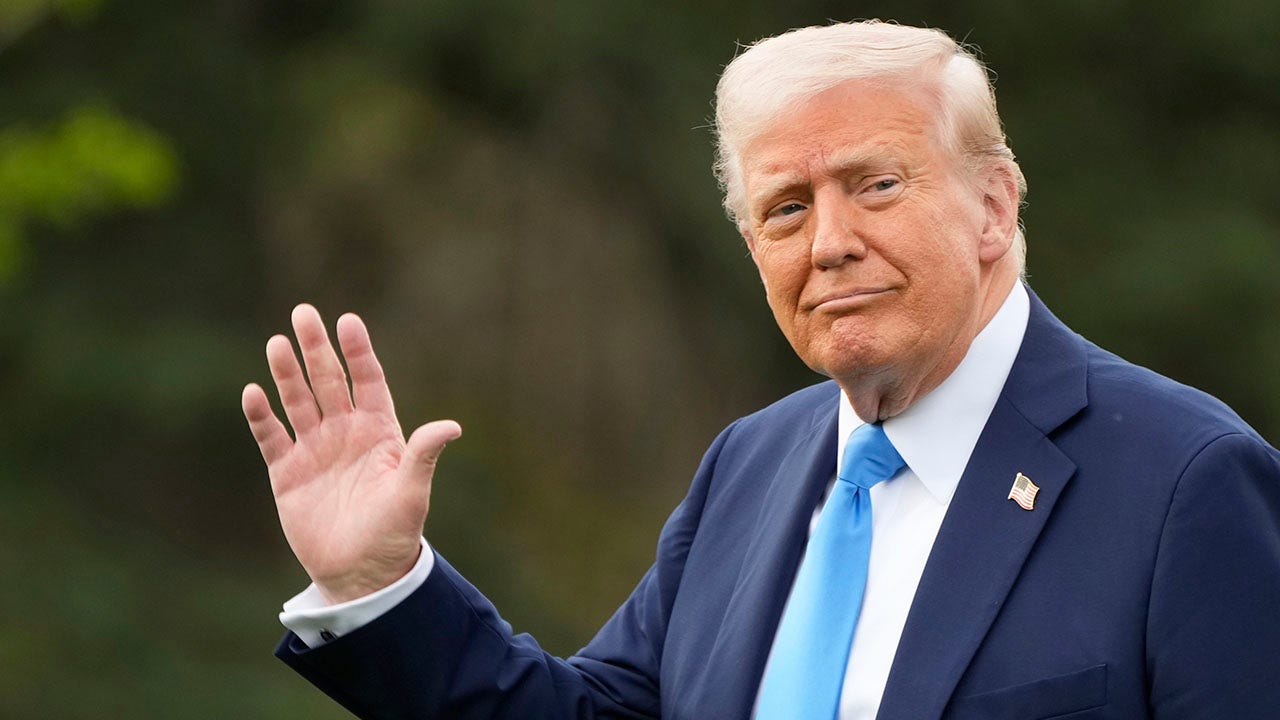World
Dutch election: Here’s why a nitrogen reduction target is a big issue
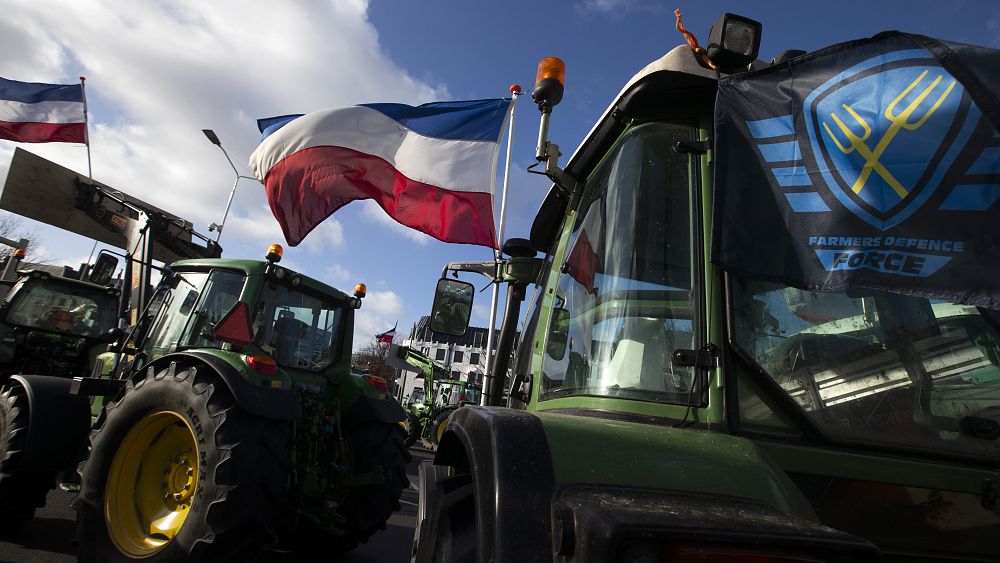
In a country of less than 18 million people and more than 116 million livestock, agriculture reigns supreme.
As the world’s second-largest exporter of agricultural products, along with half of its land being devoted to agriculture, the Netherlands is widely considered an agri-food superpower despite its tiny size.
But this, in its own right, creates problems. Namely, nitrogen emissions.
In high concentrations, the chemical element is dangerous for both nature and water quality, and in 2019 a pollution crisis led the Dutch government to set a goal of halving emissions from the gas by 2030.
This, of course, set itself on a collision course with the Dutch farming establishment, given that almost all human activities produce it, but in the Netherlands agriculture is the biggest culprit, responsible for 50% of all nitrogen.
“Basically, here in the Netherlands, there are two big reasons why we have a nitrogen problem for the first time, and it’s because we are a very densely populated area and we have the densest livestock concentration in Europe,” Daan Boezeman from the Netherlands Environmental Assessment Agency said in an interview with Euronews.
“On the other hand, the Netherlands has taken a rather strict interpretation of the European Habitats Directive, which stipulates that for every new kind of activity, we have to realise nitrogen reduction elsewhere.”
Dutch farmers are required to reduce their nitrogen footprint or sell their properties to the Dutch state, which put in place a voluntary “buyout scheme”, with a budget of €8 billion.
However, the scheme has not been very popular.
According to Jan Arie Koorevaar, who owns 115 cows on a 90-hectare property in South Holland and produces 100 million litres of milk per year in an almost 100% organic way, the government should focus more on boosting innovation, rather than reducing the size of farms.
“A lot of farmers are worried because it’s not clear to them what they need to do on their farms to meet the demands of the government,” Koorevaar told Euronews.
“I think there are also possibilities to reduce emissions for dairy farmers as well. If you can help them with the funding to reduce them with technological innovations, but we do not have that type of measure yet.
“And the other thing would be that the government helps to make your farm more extensive. So, helping, for instance, with the availability of land.”
But the issue has turned controversial ahead of the country’s elections next week.
While farmers are pushing back against the current provisions, some parties and environmental associations want even more. They’re asking for mandatory buyouts, instead of voluntary ones, halving emissions by 2030, and stricter targets on livestock reduction.
“We demand that the government helps farmers make the transition to ecological farming with 70% fewer animals in 2030 and 80% fewer in 2050, and actually help farmers or help the market set up a system in such a way that the farmer also has a good income, producing food for humans instead of a lot of food for animals,” Hilde Anna de Vries from Greenpeace Netherlands said.

World
Grandmother arrested at abortion clinic warns of expanding free speech 'buffer zones'
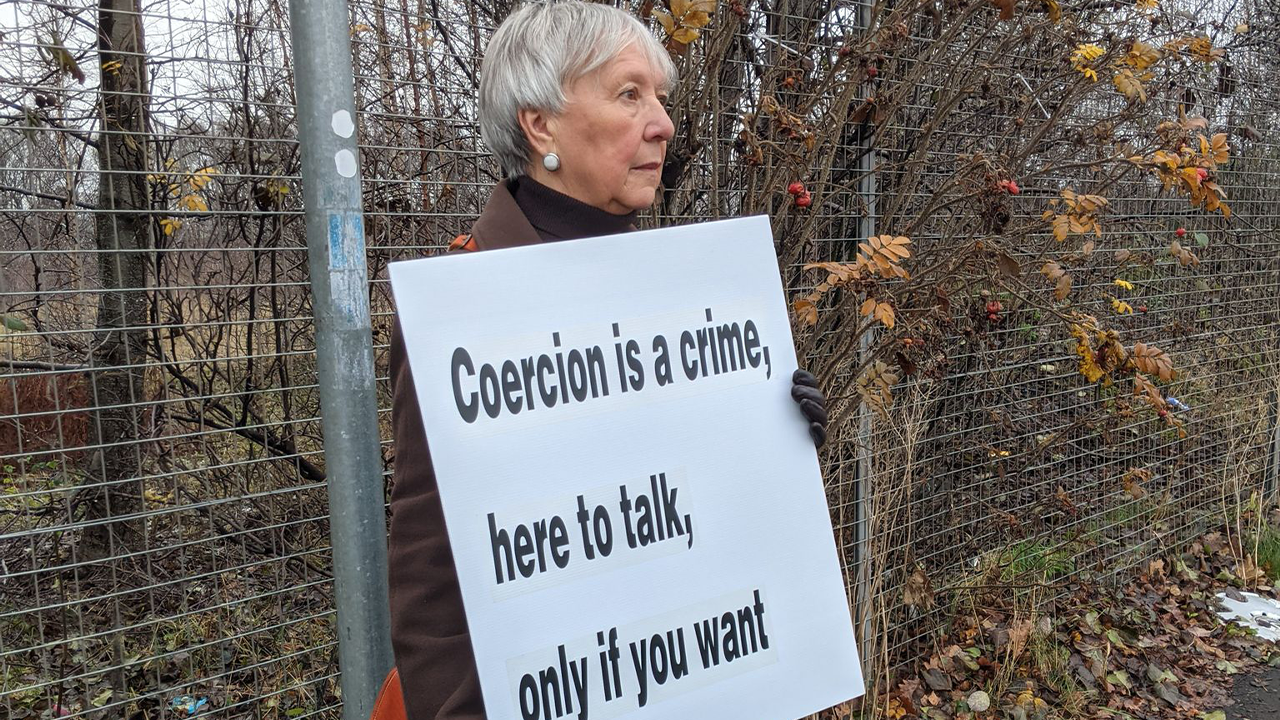
A grandmother in the U.K. who was arrested for holding a sign outside an abortion clinic is sounding the alarm against further attacks on free speech as lawmakers move to expand so-called “buffer zones” outside such facilities.
Rose Docherty, 74, was arrested in Glasgow, Scotland near the Queen Elizabeth University Hospital (QEUH) in February for holding a sign that read: “Coercion is a crime, here to talk if you want.”
Docherty was the first person to be arrested and charged under the Abortion Services (Safe Access Zones) Act, which went into effect in September, the BBC reported.
The law prohibits any protests or vigils from taking place within 200m or 656ft of 30 clinics offering abortion services in Scotland, but the law specifies that the Safe Access Zone could be extended if considered appropriate.
Docherty’s arrest came just days after Vice President JD Vance highlighted the law as an example of free speech being under attack in the U.K.
Rose Docherty, 74, was arrested in Glasgow, Scotland near the Queen Elizabeth University Hospital (QEUH) in February for holding a sign that read: “Coercion is a crime, here to talk if you want.” (Rose Docherty)
UK WOMAN THREATENED WITH FINE FOR PRAYING WITHIN ABORTION FACILITY’S ‘BUFFER ZONE:’ ‘ GROSSLY ORWELLIAN’
Now, Gillian Mackay, the Green Party parliamentarian responsible for introducing the buffer zones legislation, has now suggested that the Scottish government consider expanding the area of prohibition on “influence” outside hospitals, according to ADF International, a Christian legal advocacy group.
Docherty has rejected a formal warning from the Crown Office – arguing that it was “unjust” – and is waiting to find out what action may now be taken against her.
In her first broadcast interview since her arrest, she told the BBC she had “no reason to regret” the incident, noting it was an “alarming” and “surreal” experience.
She said she had read the law and believed her actions did not violate the legislation.
“I gave consideration to what I was doing…I looked at the law and saw what it said I couldn’t do, and thought, OK, well, this is what I can do…I can offer to listen, and if anyone wants to come and speak to me, they can do so, only if they want to come and speak with me,” she told BBC’s Scotcast.
She said she is prepared to go to prison over the offense.
Docherty has also said that the government essentially wants to stamp out any opposition to abortion.
“I believe it wouldn’t matter where we stood…it wouldn’t matter how far they pushed the ‘buffer zone,’” she told ADF International, a Christian legal advocacy group.
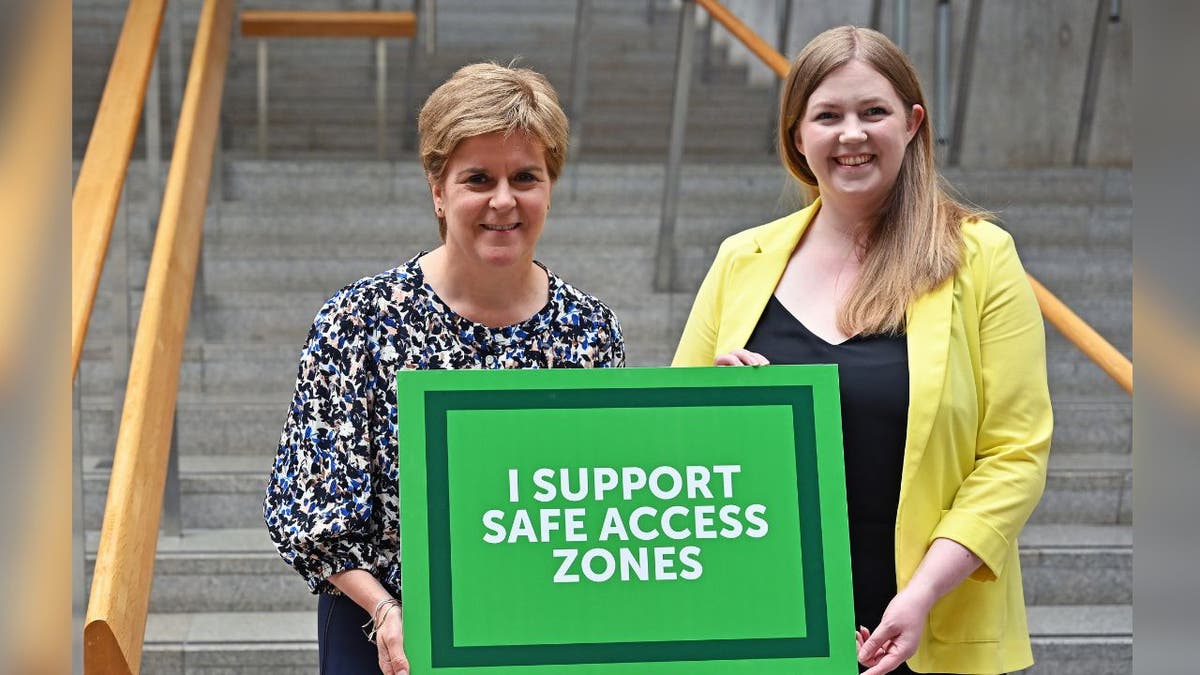
Former First Minister Nicola Sturgeon, left, poses for a photograph with Scottish Green MSP Gillian Mackay, right, in the lobby of the Scottish Parliament, in support of Mackay’s “buffer zones” bill on June 27, 2023 in Edinburgh, Scotland. (Ken Jack/Getty Images)
NEW ONLINE ‘MISINFORMATION’ BILL SLAMMED AS ‘BIGGEST ATTACK’ ON FREEDOMS IN AUSTRALIA
“It wouldn’t matter where we stood –201 meters, or 500 meters away – it seems the authorities would still try to crack down harshly and unfairly on individuals because the government simply disagree with their point of view. This is unjust – of course, there should be laws against harassment, and we all condemn such behavior. But merely offering conversations near a hospital is not a crime.”
Dr Greg Irwin, a doctor at the QEUH, was pictured confronting a group of protesters in February 2023, saying that they “cause emotional upset to patients, but also to staff members,” per the BBC. Groups have been protesting outside the hospital for 10 years, leading to the passing of the Safe Access Zones Act.
Mackay said patients and staff had told her that they still had to pass the protesters when attending the QEUH leading to distress.
“I think it’s appropriate that we take those concerns seriously and the government take a look at whether an extension is appropriate or not,” Mackay told the BBC.
The act allows ministers to extend the size of a buffer zone if it is decided that the existing zone is not adequate, a Scottish government spokesperson told the outlet.
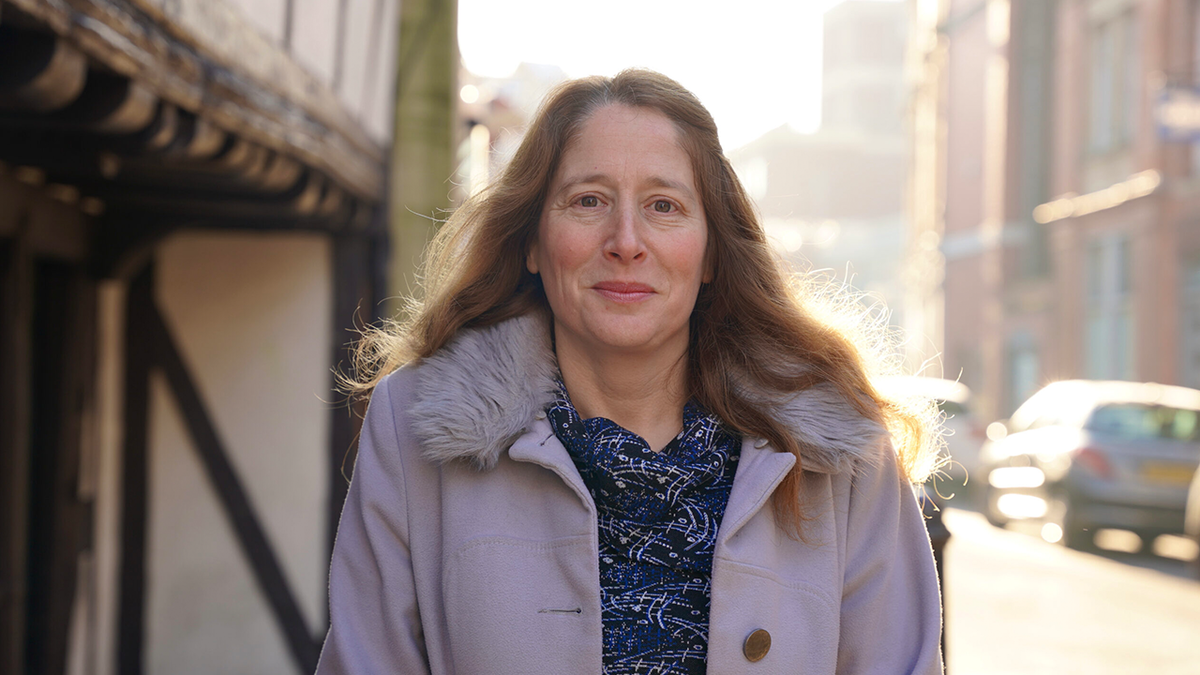
Isabel Vaughan-Spruce was arrested for praying silently outside an abortion clinic in Birmingham, England. (Alliance Defending Freedom UK)
Docherty isn’t the first person to be arrested outside abortion facilities.
For instance, Isabel Vaughan-Spruce, a prominent pro-life activist, was arrested twice in Birmingham for silently praying without any signs near an abortion facility within a buffer zone. She was arrested under a local law known as a Public Spaces Protection Order (PSPO). She was later awarded $13,000 in compensation for wrongful arrests, according to Christian Today.
The U.K. has drawn international attention for its alleged clampdown on free speech. A number of people have been investigated and arrested for social media posts.
World
Tornadoes kill 21 in US states of Missouri and Kentucky

The storms are part of a severe weather system sweeping across the Midwest, leaving thousands without power.
At least 21 people have died after tornadoes caused by severe storms swept through the states of Missouri and Kentucky in the United States, officials said.
Kentucky governor Andy Beshear on Saturday said on X that at least 14 people died in the Friday night’s storms.
At least seven others were killed in Missouri as authorities launched a search for people trapped in buildings.
Kentucky authorities said there were severe injuries when a tornado tore across Laurel County late on Friday. “The search is continuing in the damaged area for survivors,” the office of Sheriff John Root said in a statement posted on social media.
In Missouri, St Louis Mayor Cara Spencer confirmed five deaths in her city and said more than 5,000 homes were affected.
“Our city is in mourning tonight,” she told reporters. “The loss of life and destruction is truly, truly horrific.”
Another tornado struck Scott County, about 209km (130 miles) south of St Louis, killing two people, injuring several others and destroying multiple homes, Sheriff Derick Wheetley wrote on social media on Friday.
“Our first responders acted swiftly, even while the tornado was still active, putting themselves in harm’s way to provide immediate assistance and care to those injured,” he said.

The storms, which began on Friday, are part of a severe weather system that has also spawned tornadoes in Wisconsin, leaving thousands of people without power in the Great Lakes region and bringing a punishing heatwave to Texas.
A dust storm warning was issued around the Chicago area on Friday night. The weather service said a wall of dust extended along a 161km (100-mile) line from southwest of Chicago to northern Indiana that severely reduced visibility.
In Texas, a heat advisory was issued for San Antonio and Austin cities, with temperatures at a blistering 95F (35C) to 105F (40.5C). Parts of the southern East Coast, from Virginia to Florida, also battled with heat in the 90s (32-37C).
The National Weather Service Office for Austin and San Antonio said humidity over the weekend was expected to make temperatures feel hotter.
“There are concerns of heat exhaustion for people that aren’t taking proper precautions when they’re outdoors,” meteorologist Jason Runyen said, advising those affected to take breaks and stay hydrated.
World
Russia and Ukraine to hold first direct peace talks in over 3 years

-

 Austin, TX7 days ago
Austin, TX7 days agoBest Austin Salads – 15 Food Places For Good Greens!
-

 Technology1 week ago
Technology1 week agoNetflix is removing Black Mirror: Bandersnatch
-

 World1 week ago
World1 week agoThe Take: Can India and Pakistan avoid a fourth war over Kashmir?
-

 News1 week ago
News1 week agoJefferson Griffin Concedes Defeat in N.C. Supreme Court Race
-

 News1 week ago
News1 week agoReincarnated by A.I., Arizona Man Forgives His Killer at Sentencing
-

 News1 week ago
News1 week agoWho is the new Pope Leo XIV and what are his views?
-

 News1 week ago
News1 week agoEfforts Grow to Thwart mRNA Therapies as RFK Jr. Pushes Vaccine Wariness
-

 Entertainment1 week ago
Entertainment1 week agoReview: 'Forever' is a sweet ode to first love (and L.A.) based on Judy Blume's novel






